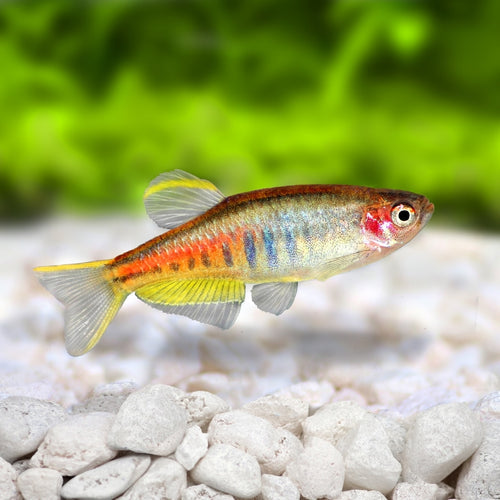
Stress and well-being in our fish
F. MattierShare
Personally, I think that a fish can feel happiness, joy, etc.
But as of today, this is only my opinion, even if studies are increasingly leaning in that direction every day.
"When I started fishkeeping, these questions about the feelings of fish were not even considered. Hence the legend of the 'goldfish memory', whereas it is now proven that fish can learn, use tools, memorize, recognize faces, etc."

What is certain is that, at the very least, fish feel stress and well-being.
It is also known that excessive stress can kill any animal.
This is largely the reason for the fragility of aquarium fish. Their life is just a long series of stresses, from breeding to capture, transport(s), the store, arrival in the aquarium, and then life in the aquarium with artificial lighting, the artificial noise of pumps, filters, captivity in a small volume, close company of different species, and a decor more suited for the human eye than to satisfy a fish.

It is these accumulated stresses, and therefore toxic, that make our fish ultra-sensitive to parameters, parasites, temperature, etc.
In nature, a fish that flees at your arrival and dives deep can lose 6 degrees of temperature between the surface and the bottom in just one second! And this is not a problem for it.
The experience of the poubellarium proves it: fish returned to nature, restored to a certain wild life, become very tolerant of conditions that would be fatal to them in an aquarium.
The sunrise and sunset are not an artificial and abrupt ignition. Instead of two meals a day at best, made of industrial flakes, the fish hunts dozens of insects and various larvae every day, many different kinds. This incessant search occupies it.
The often opaque water reassures him, hiding him from our view. Similarly, the opaque walls remind us that, in nature, only the surface is transparent!

We can therefore deduce that, like all other animals, excessive stress that decreases well-being is the source of the fish's fragilities and vulnerabilities. Being happy is good for health.
It has been demonstrated that a low level of stress provides pleasure, while an excessive level makes all stress toxic.
A fish that dies during its acclimatization, after an exhausting international journey, actually dies from stress. And nothing else.

"It is time to become aware of this dimension. It is much more effective for our fish to reduce their stress than to handle the chemist's briefcase to adapt the environment in a nearly clinical way."
A clean aquarium is stressful for a fish. It gets bored there.
Removing pumps and filtration finally makes its aquatic environment a little quieter, like in nature. And above all, feeding it with natural microfauna, as nature intended, is the height of happiness: exploration, pursuit, excitement, taste, balance, and nutritional complexity…
"It is no longer possible to consider fish as anything other than sentient beings, entitled to well-being. And this should lead us to rethink aquarium practices."

2 comments
Je partage cette idée que nous ne ferons jamais mieux que la nature qui a l’expérience de plusieurs millions d’années d’évolution, où les organismes vivants ont coexisté ensemble pour atteindre une harmonie parfaite et subtile entre mutualisme, parasitisme et symbiose…
Nos petites certitudes et technologies arrogantes qui ont pour vocation de servir notre égo, ne sont rien à côté…
Bon sens, humilité et émerveillement… Nous avons tellement à observer et à apprendre !
Merci pour votre approche révolutionnaire du monde aquariophile
Il n’y a effectivement que peu d’études et articles sur leur capacité à ressentir, mémoriser et reconnaître.
Tout ce que je peux dire c’est que parmi mes quelques poissons certains sont particulièrement réactifs à ma présence dont un qui se rapproche systématiquement à la surface bouche ouverte pour recevoir une friandise. Il ne me fuit jamais au contraire. Notre peau est couverte d’enzymes, acides aminés, molécules diverses et variées qui dans l’eau doivent dégager quelque chose de particulier propre à chacun car selon qui met les mains dans l’eau, les poissons viennent ou pas.
Réflexe conditionné, capacité à ressentir des émotions, je ne sais pas, mais ce dont je suis certaine c’est qu’ils ont chacun leur personnalité et qu’ils peuvent faire preuve d’ingéniosité lorsque quelque chose les intéresse.
Mon petit chouchou se souvient peut-être que lorsqu’il est arrivé dans mon bassin c’était le plus timide et le plus chétif et que je lui mettais tout à coté de lui un peu de nourriture pour qu’il survive face aux autres qui le chassaient, car oui ils ont une hiérarchie dans leur groupe !
Aujourd’hui même si il reste le plus petit, il a fait sa place.